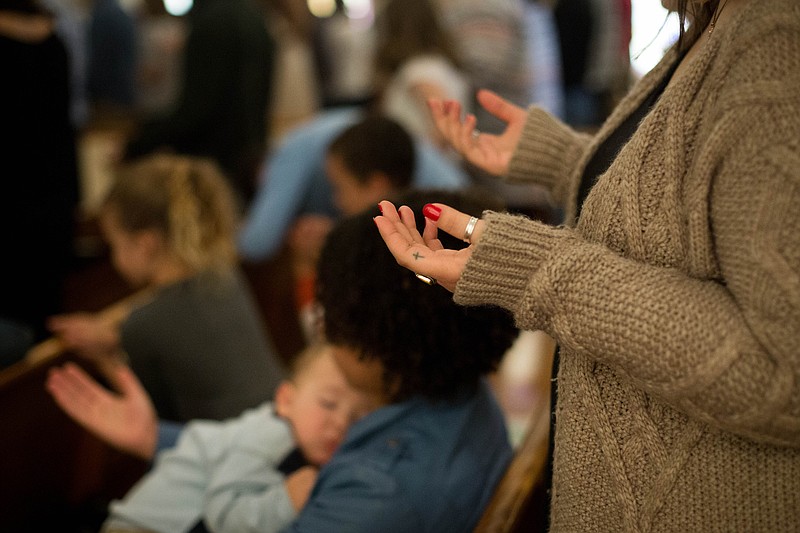A new Gallup poll delineates a startling drop in United States church membership, but people don't need a poll to see what their eyes have already told them.
After all, they've already seen the empty pews, the available church parking spaces, the populated Sunday brunch cafes and the crowded sports fields.
"There was once a time when most families would hardly question being at their home church on Sunday mornings, Sunday evenings and Wednesday nights, too," said American Pastors Network president and national radio and television host Sam Rohrer.
Now, not so much.
On average, 20 years ago, according to Gallup, 69% of U.S. adults were members of a church, but in 2016-2018, only 52% of adults were members.
Although it's been widely reported that the number of Americans with no religious affiliation has grown sharply over the same period, church membership figures haven't been as frequently noted.
Church membership was remarkably consistent - 70% or higher - from 1937 through 1976, according to Gallup, and still averaged 68% from the rest of the 1970s through the 1990s.
Gallup says the decline reflects the fact fewer Americans than in the past have any religious affiliation and that even those who do are less likely to belong to a place of worship.
That's fine as far as it goes, but the polling organization does not delve into why those things have occurred.
We don't believe the answer is too complicated, but if we knew how to reverse the trend we would, because we believe there is value in religion, in membership in a body of believers who share your faith, and in the good that said body can do in the community.
Indeed, research shows there are even health benefits in attending worship services.
A 2017 Vanderbilt University study, "Church Attendance, Allostatic Load and Mortality in Middle-Aged Adults," showed that middle-aged adults (ages 40-65) - both men and women - who attend houses of worship reduce their risk of mortality by 55 percent.
"Our findings support the overall hypothesis that increased religiosity - as determined by attendance at worship services - is associated with less stress and enhanced longevity," said Marino Bruce, a research associate professor of medicine, health and society at Vanderbilt. "We've found that being in a place where you can flex those spiritual muscles is actually beneficial for your health.
The researchers analyzed subjects' attendance at worship services, mortality and allostatic load. Allostatic load is a physiological measurement of factors including cardiovascular (blood pressure, cholesterol-high density lipoprotein ration and homocysteine), nutritional/inflammatory (albumin, C-reactive protein) and metabolic (waist-hip ratio, glycated hemoglobin) measures. The higher the allostatic load, the more stressed an individual was interpreted as being.
Non-worshipers, according to Bruce, had significantly higher overall allostatic load scores and higher prevalence of high-risk values for three of the 10 markers of allostatic load than did churchgoers and other worshipers.
The effects of attendance at worship services remained after education, poverty, health insurance and social support status were all taken into consideration, he said.
But beyond physical health, we're also wired for religion, according to Beth Azar, writing for the American Psychological Association.
Various researchers, she said, have found that our basic cognitive equipment biases us toward certain kinds of thinking and leads to thoughts about a pre-life, an afterlife, gods and invisible beings that are doing things, and that our memory system appears to be exceptionally good at remembering the kinds of stories found in many religious texts.
Meanwhile, Azar wrote, other research has shown that religion helped us form increasingly larger social groups, held together by common beliefs; led us to see the world as a place with an intentional design, created by someone or something; encouraged people to be more charitable by promoting belief in a supernatural agent; allowed us to be calmer and more graceful under pressure; and that people who are religious live longer, are less prone to depression, are less likely to abuse alcohol and drugs, and even go to the dentist more often.
As to why the drop in church membership has occurred, we believe it's no more complicated than a love of self outstripping the love for a high power (most often expressed as God), and of people putting individual needs, wants and desires ahead of a life in which the self is second and in which the higher power and the needs of others are predominant.
The Gallup poll points briefly to previous research in which Americans expressed eroding confidence in the institution of organized religion, but we believe that's an easier out for most than admitting they simply want to be No. 1 in their lives.
No, church membership and participation in services remind - or should remind - adherents of the primacy of a higher power. But if you have no religion or have a religion but are not a member of a church, you don't have to be reminded that you are not the only master of your fate and the captain of your soul.
